Critical Management in a Global Context: Leadership and Resistance
VerifiedAdded on 2023/03/20
|6
|1213
|87
Report
AI Summary
This report critically analyzes leadership and employee resistance within a global context. It begins by discussing the problems associated with transformational leadership, drawing on the debate between Mark Learmonth and Kevin Morrell, highlighting issues like the need for change, lack of inspiring vision, and poor communication. The report then explores employee resistance to management, examining the viewpoints of Sierk Ybema and Martha Horvers regarding change management, promotional changes, and the implications for stakeholders. The analysis considers how employees resist change and the impact of such resistance, emphasizing the importance of thoughtful change strategies, rewards, and the social nature of stakeholders. The conclusion summarizes the key findings regarding leadership challenges and stakeholder implications in the face of resistance to change in the workplace.
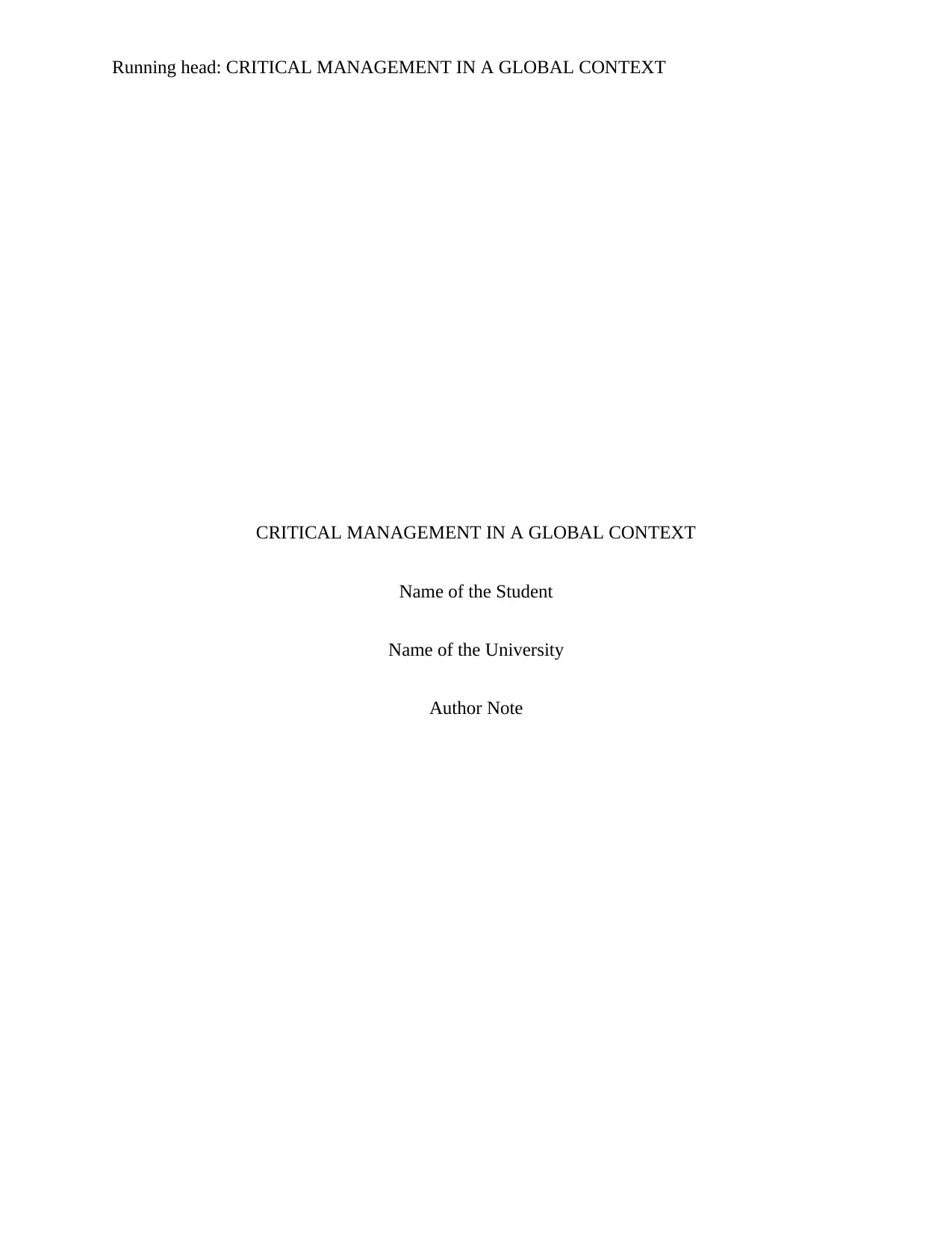
Running head: CRITICAL MANAGEMENT IN A GLOBAL CONTEXT
CRITICAL MANAGEMENT IN A GLOBAL CONTEXT
Name of the Student
Name of the University
Author Note
CRITICAL MANAGEMENT IN A GLOBAL CONTEXT
Name of the Student
Name of the University
Author Note
Paraphrase This Document
Need a fresh take? Get an instant paraphrase of this document with our AI Paraphraser
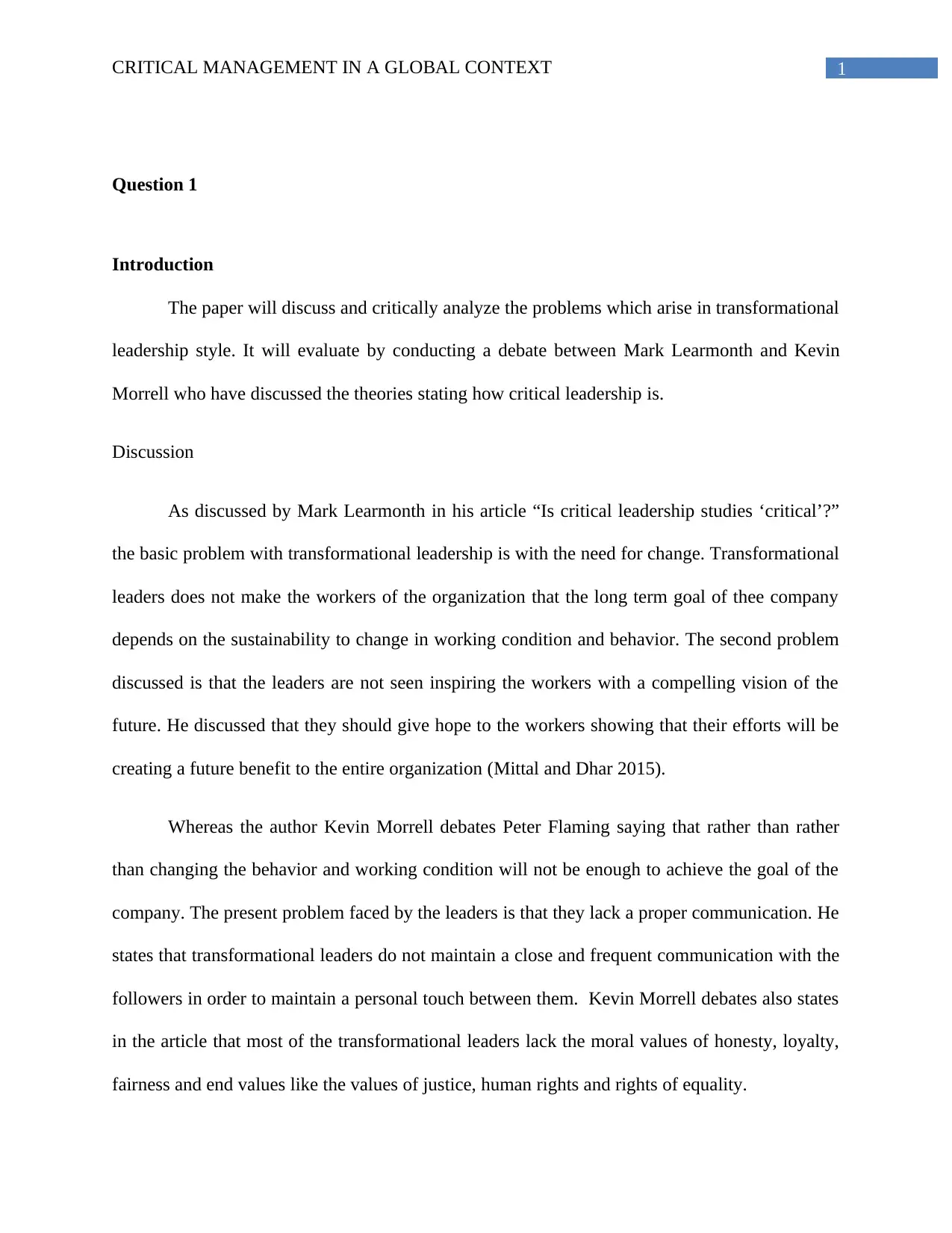
1CRITICAL MANAGEMENT IN A GLOBAL CONTEXT
Question 1
Introduction
The paper will discuss and critically analyze the problems which arise in transformational
leadership style. It will evaluate by conducting a debate between Mark Learmonth and Kevin
Morrell who have discussed the theories stating how critical leadership is.
Discussion
As discussed by Mark Learmonth in his article “Is critical leadership studies ‘critical’?”
the basic problem with transformational leadership is with the need for change. Transformational
leaders does not make the workers of the organization that the long term goal of thee company
depends on the sustainability to change in working condition and behavior. The second problem
discussed is that the leaders are not seen inspiring the workers with a compelling vision of the
future. He discussed that they should give hope to the workers showing that their efforts will be
creating a future benefit to the entire organization (Mittal and Dhar 2015).
Whereas the author Kevin Morrell debates Peter Flaming saying that rather than rather
than changing the behavior and working condition will not be enough to achieve the goal of the
company. The present problem faced by the leaders is that they lack a proper communication. He
states that transformational leaders do not maintain a close and frequent communication with the
followers in order to maintain a personal touch between them. Kevin Morrell debates also states
in the article that most of the transformational leaders lack the moral values of honesty, loyalty,
fairness and end values like the values of justice, human rights and rights of equality.
Question 1
Introduction
The paper will discuss and critically analyze the problems which arise in transformational
leadership style. It will evaluate by conducting a debate between Mark Learmonth and Kevin
Morrell who have discussed the theories stating how critical leadership is.
Discussion
As discussed by Mark Learmonth in his article “Is critical leadership studies ‘critical’?”
the basic problem with transformational leadership is with the need for change. Transformational
leaders does not make the workers of the organization that the long term goal of thee company
depends on the sustainability to change in working condition and behavior. The second problem
discussed is that the leaders are not seen inspiring the workers with a compelling vision of the
future. He discussed that they should give hope to the workers showing that their efforts will be
creating a future benefit to the entire organization (Mittal and Dhar 2015).
Whereas the author Kevin Morrell debates Peter Flaming saying that rather than rather
than changing the behavior and working condition will not be enough to achieve the goal of the
company. The present problem faced by the leaders is that they lack a proper communication. He
states that transformational leaders do not maintain a close and frequent communication with the
followers in order to maintain a personal touch between them. Kevin Morrell debates also states
in the article that most of the transformational leaders lack the moral values of honesty, loyalty,
fairness and end values like the values of justice, human rights and rights of equality.
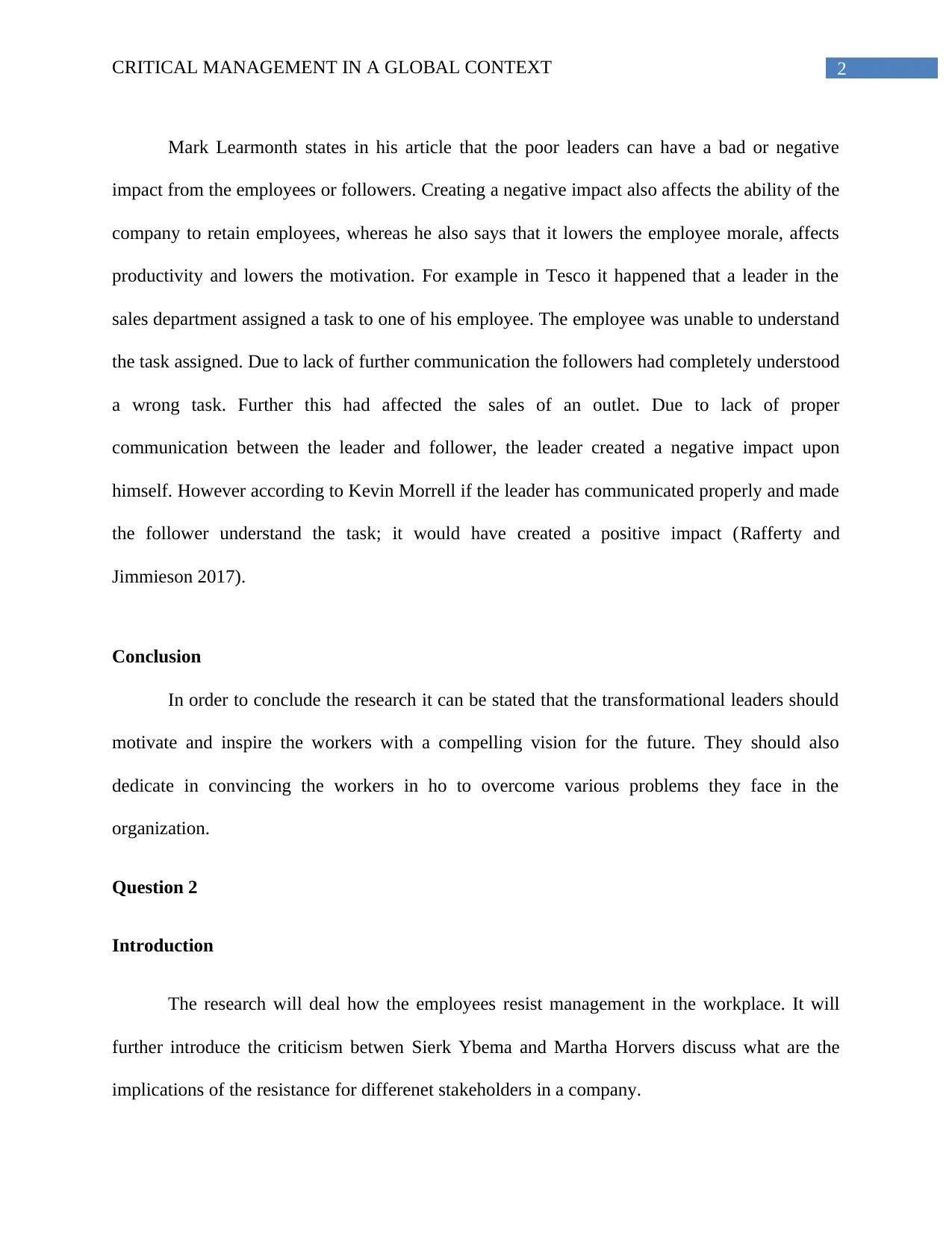
2CRITICAL MANAGEMENT IN A GLOBAL CONTEXT
Mark Learmonth states in his article that the poor leaders can have a bad or negative
impact from the employees or followers. Creating a negative impact also affects the ability of the
company to retain employees, whereas he also says that it lowers the employee morale, affects
productivity and lowers the motivation. For example in Tesco it happened that a leader in the
sales department assigned a task to one of his employee. The employee was unable to understand
the task assigned. Due to lack of further communication the followers had completely understood
a wrong task. Further this had affected the sales of an outlet. Due to lack of proper
communication between the leader and follower, the leader created a negative impact upon
himself. However according to Kevin Morrell if the leader has communicated properly and made
the follower understand the task; it would have created a positive impact (Rafferty and
Jimmieson 2017).
Conclusion
In order to conclude the research it can be stated that the transformational leaders should
motivate and inspire the workers with a compelling vision for the future. They should also
dedicate in convincing the workers in ho to overcome various problems they face in the
organization.
Question 2
Introduction
The research will deal how the employees resist management in the workplace. It will
further introduce the criticism betwen Sierk Ybema and Martha Horvers discuss what are the
implications of the resistance for differenet stakeholders in a company.
Mark Learmonth states in his article that the poor leaders can have a bad or negative
impact from the employees or followers. Creating a negative impact also affects the ability of the
company to retain employees, whereas he also says that it lowers the employee morale, affects
productivity and lowers the motivation. For example in Tesco it happened that a leader in the
sales department assigned a task to one of his employee. The employee was unable to understand
the task assigned. Due to lack of further communication the followers had completely understood
a wrong task. Further this had affected the sales of an outlet. Due to lack of proper
communication between the leader and follower, the leader created a negative impact upon
himself. However according to Kevin Morrell if the leader has communicated properly and made
the follower understand the task; it would have created a positive impact (Rafferty and
Jimmieson 2017).
Conclusion
In order to conclude the research it can be stated that the transformational leaders should
motivate and inspire the workers with a compelling vision for the future. They should also
dedicate in convincing the workers in ho to overcome various problems they face in the
organization.
Question 2
Introduction
The research will deal how the employees resist management in the workplace. It will
further introduce the criticism betwen Sierk Ybema and Martha Horvers discuss what are the
implications of the resistance for differenet stakeholders in a company.
⊘ This is a preview!⊘
Do you want full access?
Subscribe today to unlock all pages.

Trusted by 1+ million students worldwide
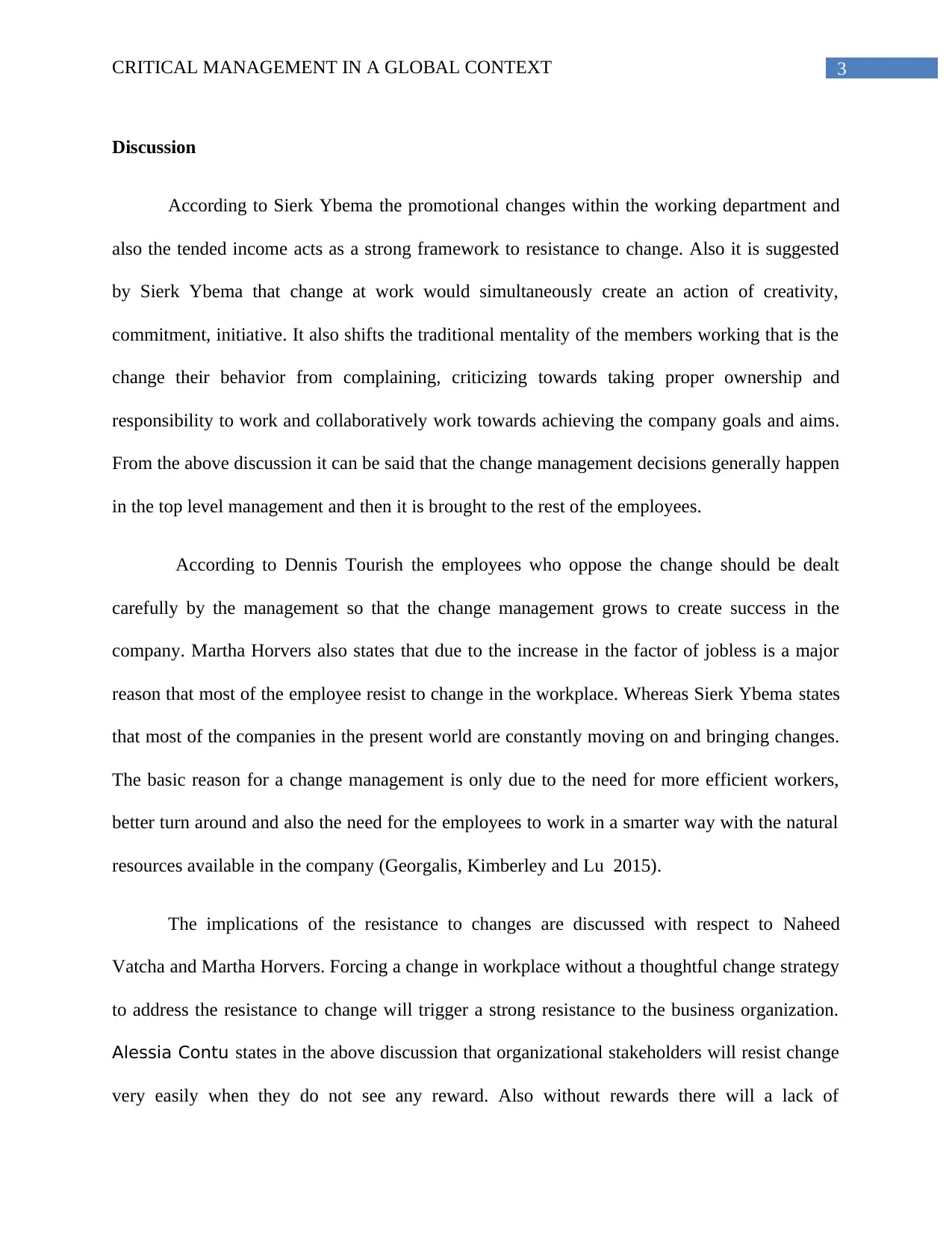
3CRITICAL MANAGEMENT IN A GLOBAL CONTEXT
Discussion
According to Sierk Ybema the promotional changes within the working department and
also the tended income acts as a strong framework to resistance to change. Also it is suggested
by Sierk Ybema that change at work would simultaneously create an action of creativity,
commitment, initiative. It also shifts the traditional mentality of the members working that is the
change their behavior from complaining, criticizing towards taking proper ownership and
responsibility to work and collaboratively work towards achieving the company goals and aims.
From the above discussion it can be said that the change management decisions generally happen
in the top level management and then it is brought to the rest of the employees.
According to Dennis Tourish the employees who oppose the change should be dealt
carefully by the management so that the change management grows to create success in the
company. Martha Horvers also states that due to the increase in the factor of jobless is a major
reason that most of the employee resist to change in the workplace. Whereas Sierk Ybema states
that most of the companies in the present world are constantly moving on and bringing changes.
The basic reason for a change management is only due to the need for more efficient workers,
better turn around and also the need for the employees to work in a smarter way with the natural
resources available in the company (Georgalis, Kimberley and Lu 2015).
The implications of the resistance to changes are discussed with respect to Naheed
Vatcha and Martha Horvers. Forcing a change in workplace without a thoughtful change strategy
to address the resistance to change will trigger a strong resistance to the business organization.
Alessia Contu states in the above discussion that organizational stakeholders will resist change
very easily when they do not see any reward. Also without rewards there will a lack of
Discussion
According to Sierk Ybema the promotional changes within the working department and
also the tended income acts as a strong framework to resistance to change. Also it is suggested
by Sierk Ybema that change at work would simultaneously create an action of creativity,
commitment, initiative. It also shifts the traditional mentality of the members working that is the
change their behavior from complaining, criticizing towards taking proper ownership and
responsibility to work and collaboratively work towards achieving the company goals and aims.
From the above discussion it can be said that the change management decisions generally happen
in the top level management and then it is brought to the rest of the employees.
According to Dennis Tourish the employees who oppose the change should be dealt
carefully by the management so that the change management grows to create success in the
company. Martha Horvers also states that due to the increase in the factor of jobless is a major
reason that most of the employee resist to change in the workplace. Whereas Sierk Ybema states
that most of the companies in the present world are constantly moving on and bringing changes.
The basic reason for a change management is only due to the need for more efficient workers,
better turn around and also the need for the employees to work in a smarter way with the natural
resources available in the company (Georgalis, Kimberley and Lu 2015).
The implications of the resistance to changes are discussed with respect to Naheed
Vatcha and Martha Horvers. Forcing a change in workplace without a thoughtful change strategy
to address the resistance to change will trigger a strong resistance to the business organization.
Alessia Contu states in the above discussion that organizational stakeholders will resist change
very easily when they do not see any reward. Also without rewards there will a lack of
Paraphrase This Document
Need a fresh take? Get an instant paraphrase of this document with our AI Paraphraser
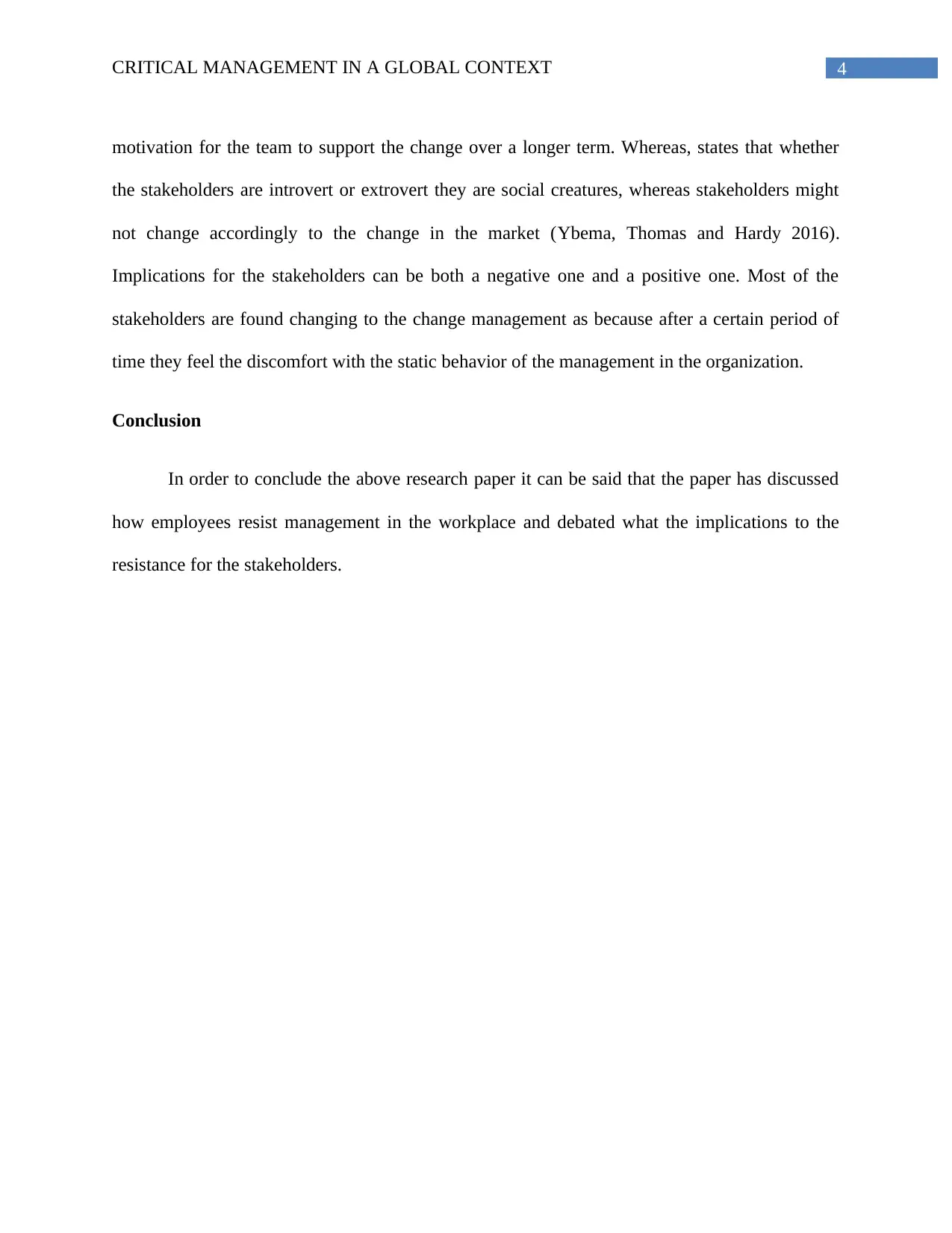
4CRITICAL MANAGEMENT IN A GLOBAL CONTEXT
motivation for the team to support the change over a longer term. Whereas, states that whether
the stakeholders are introvert or extrovert they are social creatures, whereas stakeholders might
not change accordingly to the change in the market (Ybema, Thomas and Hardy 2016).
Implications for the stakeholders can be both a negative one and a positive one. Most of the
stakeholders are found changing to the change management as because after a certain period of
time they feel the discomfort with the static behavior of the management in the organization.
Conclusion
In order to conclude the above research paper it can be said that the paper has discussed
how employees resist management in the workplace and debated what the implications to the
resistance for the stakeholders.
motivation for the team to support the change over a longer term. Whereas, states that whether
the stakeholders are introvert or extrovert they are social creatures, whereas stakeholders might
not change accordingly to the change in the market (Ybema, Thomas and Hardy 2016).
Implications for the stakeholders can be both a negative one and a positive one. Most of the
stakeholders are found changing to the change management as because after a certain period of
time they feel the discomfort with the static behavior of the management in the organization.
Conclusion
In order to conclude the above research paper it can be said that the paper has discussed
how employees resist management in the workplace and debated what the implications to the
resistance for the stakeholders.
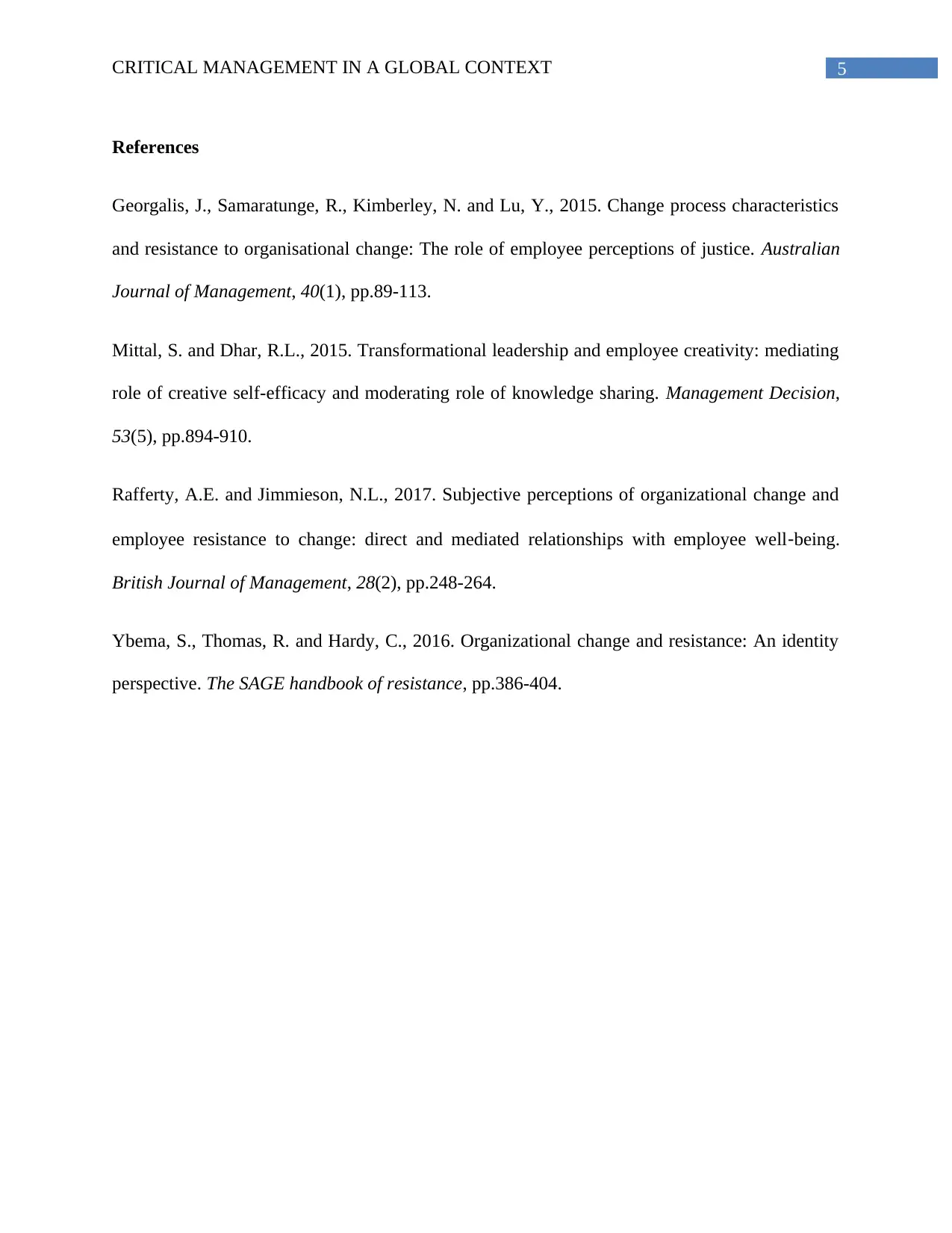
5CRITICAL MANAGEMENT IN A GLOBAL CONTEXT
References
Georgalis, J., Samaratunge, R., Kimberley, N. and Lu, Y., 2015. Change process characteristics
and resistance to organisational change: The role of employee perceptions of justice. Australian
Journal of Management, 40(1), pp.89-113.
Mittal, S. and Dhar, R.L., 2015. Transformational leadership and employee creativity: mediating
role of creative self-efficacy and moderating role of knowledge sharing. Management Decision,
53(5), pp.894-910.
Rafferty, A.E. and Jimmieson, N.L., 2017. Subjective perceptions of organizational change and
employee resistance to change: direct and mediated relationships with employee well‐being.
British Journal of Management, 28(2), pp.248-264.
Ybema, S., Thomas, R. and Hardy, C., 2016. Organizational change and resistance: An identity
perspective. The SAGE handbook of resistance, pp.386-404.
References
Georgalis, J., Samaratunge, R., Kimberley, N. and Lu, Y., 2015. Change process characteristics
and resistance to organisational change: The role of employee perceptions of justice. Australian
Journal of Management, 40(1), pp.89-113.
Mittal, S. and Dhar, R.L., 2015. Transformational leadership and employee creativity: mediating
role of creative self-efficacy and moderating role of knowledge sharing. Management Decision,
53(5), pp.894-910.
Rafferty, A.E. and Jimmieson, N.L., 2017. Subjective perceptions of organizational change and
employee resistance to change: direct and mediated relationships with employee well‐being.
British Journal of Management, 28(2), pp.248-264.
Ybema, S., Thomas, R. and Hardy, C., 2016. Organizational change and resistance: An identity
perspective. The SAGE handbook of resistance, pp.386-404.
⊘ This is a preview!⊘
Do you want full access?
Subscribe today to unlock all pages.

Trusted by 1+ million students worldwide
1 out of 6
Related Documents
Your All-in-One AI-Powered Toolkit for Academic Success.
+13062052269
info@desklib.com
Available 24*7 on WhatsApp / Email
![[object Object]](/_next/static/media/star-bottom.7253800d.svg)
Unlock your academic potential
Copyright © 2020–2026 A2Z Services. All Rights Reserved. Developed and managed by ZUCOL.





